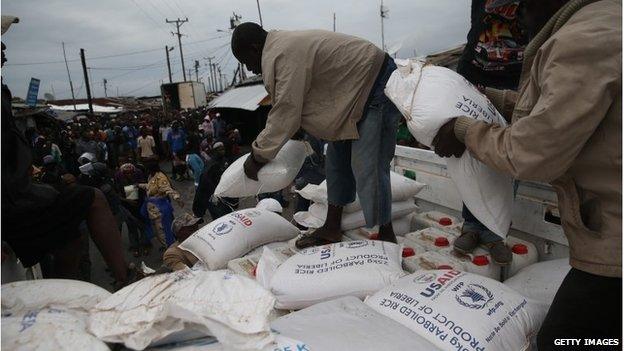Ebola outbreak: West Africa food harvests 'at risk'
- Published

Even before the outbreak, some households were spending 80% of their income on food
The Ebola outbreak is putting food harvests in West Africa "at serious risk", the UN's Food and Agriculture Organization (FAO) warns.
It has raised a special alert for Liberia, Sierra Leone and Guinea, the three countries worst affected.
Rice and maize production will be particularly affected during the coming harvest season, says the FAO.
The food shortages are expected to worsen in the coming months.
The outbreak has killed at least 1,550 of the 3,000 people in four countries since March - the worst Ebola outbreak in history.
In other developments:
31 people have now died from a separate Ebola outbreak in the Democratic Republic of Congo, says the World Health Organization, external (WHO)
Medical charity Medecins Sans Frontieres says a "global bio-disaster response" is needed, external, with far more aid for the affected countries
World Bank President Jim Yong Kim wrote in a newspaper editorial, external that people are dying needlessly because of the world's "disastrously inadequate response" to the outbreak
Nurses in Liberia's largest hospital are on strike, refusing to return to work until they are issued with protective equipment
After a Guinean student with Ebola escaped from a clinic in his homeland and took Ebola to Dakar, Senegal's president said if the student were not sick "he would be before the courts"
Ivory Coast's government allows Sierra Leone's football team to play an Africa Nations Cup qualifier in Abidjan despite the travel ban imposed over the Ebola outbreak
Major price spikes
For months now, quarantine zones and restrictions on movement imposed to help contain the Ebola disease have severely hampered the transport and sale of food, the Rome-based FAO says., external
Consequently food prices have shot up, as panic buying and shortages have set in, and getting access to food has become a pressing concern for many people in all three worst-hit countries in West Africa.
The price of cassava, for example, rose 150% in the first weeks of August in the Liberian capital, Monrovia.
"Even prior to the Ebola outbreak, households in some of the affected areas were spending up to 80% of their incomes on food," said Vincent Martin, head of the FAO's Dakar-based Resilience Hub, which is co-ordinating the agency's emergency response.
"These latest price spikes are effectively putting food completely out of their reach," he added.
To meet short-term food needs, the FAO has jointly approved an emergency programme with the UN's World Food Programme to deliver 65,000 tonnes of food to the estimated 1.3 million people affected by Ebola over three months.

Ebola Virus Disease (EVD)
Symptoms include high fever, bleeding and central nervous system damage
Spread by body fluids such as blood and saliva
Fatality rate can reach 90% - but current outbreak has mortality rate of about 55%
Incubation period is two to 21 days
There is no proven vaccine or cure
Supportive care such as rehydrating patients who have diarrhoea and vomiting can help recovery
Fruit bats, a delicacy for some West Africans, are considered to be virus's natural host

Are you in the affected regions? Your can send details of your experiences to haveyoursay@bbc.co.uk, external